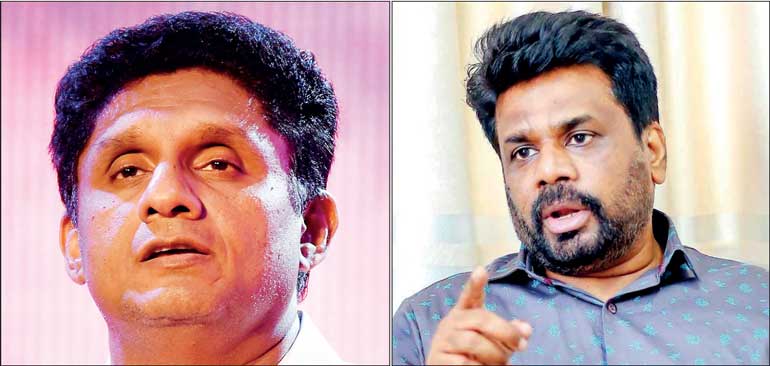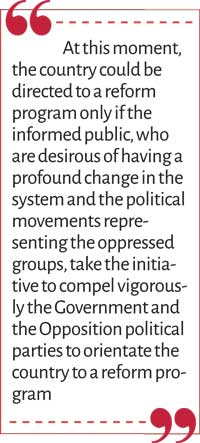Sunday Feb 15, 2026
Sunday Feb 15, 2026
Friday, 4 November 2022 00:02 - - {{hitsCtrl.values.hits}}

It seems that neither the main Opposition nor the JVP wants to be a party to such a reformation program. Both movements appear to think that such a program of reforms will weaken their position and strengthen the position of the Government. Also, they seem to believe that such a program will prevent their opportunity to have an early election that will allow them to gain power
 The major focus of the political dialogue in the country during the Aragalaya, the youth struggle, was on the need for having positive and profound change in the institutional and political system which is evil, oppressive and corrupt, and the reforms that should be introduced to overcome the situation. It can be said to have been the main theme of it.
The major focus of the political dialogue in the country during the Aragalaya, the youth struggle, was on the need for having positive and profound change in the institutional and political system which is evil, oppressive and corrupt, and the reforms that should be introduced to overcome the situation. It can be said to have been the main theme of it.
However, by now the situation has changed, creating an atmosphere in which the struggle and its leaders have largely been swallowed up by mainstream political parties. In this backdrop, it can be said that the dialogue on the need for having a system change has been subdued and the focus is shifted towards toppling the Government.
Even a reform program of the people cannot be enacted and implemented without the support of the Parliament in spite of the fact that the sovereignty lies with the people; the support of the ruling party is essential to enact a reform program. Legalisation of major reforms such as amendments to the Constitution or making a new Constitution necessarily requires the support of the Opposition.
Even though the enactment of a legal reform can be done with majority agreement of the Parliament, it is however essential to have the consent of a large parliamentary majority to amend the Constitution or adopt a new Constitution. A program of legal reforms may be introduced with the consent of the ruling party only; but a program of constitutional reforms that goes beyond general legal reforms require the support of the Opposition in addition to the consent of the ruling party.
Adopting ideal constitutions
The moment a country has gained independence after being under foreign subjugation can be considered as the best opportunity for launching an ideal constitutional reform program. The American Constitution (1789) and the Indian Constitution (1950) can be cited as two of the 10 best constitutions the world has ever produced.
The countries having long-standing sensitivity to the rule of law, the sovereignty of the people and the system of governance too, may have advanced constitutions and constitutional traditions. Britain and Switzerland are two examples that could be cited for that.
Also, the countries which were under colonial rule and had received a good Constitution at the time of independence from the colonial master and possessed an advanced level of discipline necessary for improving and sustaining t in a constructive manner can have advanced Constitutions and Constitutional traditions. Canada is a good example of that.
When a country is caught up in a deep crisis where it finds it impossible to move forward even a single step, it would still be possible to adopt a constructive constitution with profound reforms to overcome the situation. South Africa can be considered as the best example that could be cited to support this notion.
The present Constitution of South Africa is considered to be the best Constitution in the world. Prior to the introduction of reforms, the survival of South Africa was in a critical state due to the strict sanctions imposed internationally against the extremist apartheid policies it followed.
The conflict between the ‘blacks’ and the ‘whites’ had reached a critical point where neither of them could win. The leaders of both parties realised that no party could defeat the other party; and it was as a result of this understanding that the apartheid ruling party opened the doors for a reform program for a change in the system, and the black leaders led by Mandala became an active party in that program.
Consequently, since 1994, South Africa has transitioned from the system of apartheid to one of majority rule. There is an opinion widespread in our country that the ruling party that has pursued a corrupt and oppressive rule cannot join a reforms program to change it. The South African experience disproves this observation.
 Situation in Sri Lanka
Situation in Sri Lanka
In my opinion, Sri Lanka is now in a unique socio-political ambiance where it is possible to win a reform program including the adoption of a participatory Constitution that could bring about a profound and positive change in the evil and corrupt system which prevails at the moment. Implementation of necessary reforms to overcome the balance of payments crisis has become an indispensable condition for the survival of the State.
On the other hand, the accepted view of the World Bank as well as the international community is that it is essential to have socio-political reforms implemented in addition to economic reforms. Therefore, the Government has no ability to oppose a reform program that will bring about a positive and profound change in the system.
But it seems that neither the main Opposition nor the JVP wants to be a party to such a reformation program. Both movements appear to think that such a program of reforms will weaken their position and strengthen the position of the Government. Also, they seem to believe that such a program will prevent their opportunity to have an early election that will allow them to gain power.
But a methodology could be established to ensure that the reform program will not weaken their existence and also help share the credit gained by the reforms program in a reasonable manner among all the parties involved in the process. Also, it is possible to create a situation where the elections could be held within the reformation process itself.
We can use the same method adopted by South Africa with certain changes, for Sri Lanka.
a) It is possible to reach a general consensus on the principles of a program that will lead to a profound and positive change in the system
b) A general consensus can be reached for a system that ensures public participation in the entire reform program including the adoption of a new Constitution
c) The reform program should have three main objectives:
1. Building of the nation to eliminate the caste system and resolve ethnic and religious issues
2. Transformation of the political system which is corrupt and inefficient into one that is clean, efficient and where the rule of law will reign
3. Formulation of a new Participatory Constitution that will provide policy guidelines and rules and regulations needed to achieve these goals
d) The entire reform program can be implemented in two phases:
1. In the first phase, it would be possible to launch judicial reforms including the restoration of the power of judicial review, and introduce necessary reforms to ensure free and fair elections for the legislature under the chosen system of governance and also to ensure the internal democracy of the political parties, and thereafter to hold an election.
It is the first phase of the reform program and the Government that comes to power should implement the rest of the reforms by forming a temporary all-party Government with the other Opposition political parties
2. It is also possible to adopt an Interim Constitution to be in force for a certain period of time pending the enactment of the contemplated final Constitution, specifically elaborating the reforms to be introduced in the two phases and how they should be implemented so that whoever comes to power from the election could proceed with the implementation of reforms as a constitutionally bound obligation
 Utilisation of opportunity
Utilisation of opportunity
Failure to make proper use of this opportunity that Sri Lanka has got to bring about a profound change in the system may invariably result in the country being compelled to pay a heavy price for it. Perhaps, the country might revert to the level of the 19th century.
How can the present social system survive without making immediate and positive change in the plight of the people in the Sinhala and Tamil society, who are being oppressed by caste, ethnic and religious discrimination? How much blood has already been shed in this context? This was the main problem that has led to failure and degeneration of Sri Lanka.
At the same time, it is important that the conditions are in place in which equal human dignity is accorded to certain sexual groups who have been marginalised and deprived of human dignity completely or to a certain degree. On this issue, Sri Lanka lags far behind.
The political parties representing these oppressed social groups do not seem to be adequately sensitive to the tragic situation the oppressed people have faced. Not only have the oppressed groups in the socio political system but also the entire population of the country expected to have an immediate, positive and profound change in the system.
The outcome of the next election is not clear. Sometimes a chaotic situation where no one group would garner a clear majority might ensue. Then what will happen to the reforms? On the other hand, even if a single political party secures a majority, the winner will tend to introduce a reform program which that party prefers and not a genuine reform program that will bring about a profound change in the system.
On the other hand, failure to secure a majority approval of the Parliament for a reform program, the country will be compelled to wait with the mouth open till the next change of the Government.
At this moment, the country could be directed to a reform program only if the informed public, who are desirous of having a profound change in the system and the political movements representing the oppressed groups, take the initiative to compel vigorously the Government and the Opposition political parties to orientate the country to a reform program.
At the same time, it can be said that the need for a third social movement consisting of those who are related to the Aragalaya and the other intellectuals and activists who accept the deep necessity of having a profound change in the system to convince and persuade the Government and the Opposition parties to agree on this goal, educate both parties and the public, and also to provide a practical road map for a reform program acceptable to both parties and the public.
Such a movement will certainly be able to play a very important and effective role in ushering Sri Lanka onto a path of true reformation to bring about a real change in the existing evil and corrupt system in the country.